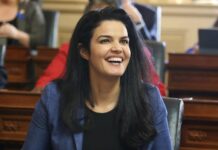
The Batten School of Leadership and Public Policy hosted a talk on Wednesday with student loan expert Beth Akers.
The senior fellow at the Manhattan Institute for Policy Research holds a doctorate in economics from Columbia University and previously served as a staff economist with the President’s Council of Economic Advisors. In her talk, “Game of Loans: The Rhetoric and Reality of Student Debt,” Akers explained how to balance the struggles of paying tuition with the long-term goals of obtaining and benefitting from an advanced degree.
The talk, based on her recently published book of the same name, allowed Akers to first address media coverage of the issue. She said that the coverage about rising student loan debt can often be misleading because it often ignores the bump in income that usually accompanies the completion of a degree in higher education, leaving students to believe that they will be in tough economic positions after graduation.
“People are worried that debt has increased over time. Obviously, this implies that the financial burden that young people are facing–or older people as they finish their education–is increasing, right?” Akers explained.
On the other hand, Akers also pointed out that more information is needed before jumping to conclusions.
“What I contend is that this is not enough,” she continued, “because we then need to know, ‘How does this compare to the income that people are facing?’ So to the extent that people are borrowing, but also seeing a positive financial return on their investment, these people are actually better off in the long run.”
Akers, who researches federal student lending policies, maintained that the fear of taking on debt shouldn’t stop young people from looking into higher education opportunities.
“Over the long run, even though debt is increasing, students may not be worse off in a financial well-being sense,” she said. “Education has a tremendous return on investment…Practically speaking, it’s very difficult to estimate that. But all of the estimates are very large and very positive.”
While education is often a wise investment, Akers warned that we need to be attentive to tuition costs getting higher as the days go by.
“The price of higher education is rising more quickly than any other sector of the economy,” Akers said. “Something kind of crazy is happening in this space, that’s for sure…It’s hard to imagine that the benefits of a degree will continue to keep pace with the rise in tuition costs,” she continued. “But time will tell.”
One way that the problem of rising education costs could be addressed, according to Akers, is through legislation. She explained that students’ monthly loan payments are actually lower on average today than they were in the past due to some key legislative fixes.
“In fact, the monthly squeeze that students are feeling is, if anything, declining over time,” she said. “This is actually driven in part by changes in policy.”
But it is not enough to focus on legislation alone if citizens want to help students to pay off their debts; in fact, Akers said that the onus is on the students in particular: they must try to complete their degrees after taking on debt. Many students choose not to finish their education when they are struggling with student loan debt, and Akers noted that these students – if they forgo their degrees – probably will not enjoy the resulting bump in income that makes paying off loans easier over time.
Last, Akers emphasized the information barrier that exists for people that could benefit from government student debt programs, and encouraged increasing both education and research about loans. Notably, the University itself has taken steps to reduce the financial burden of tuition.
“No single data set, no single analysis tells you enough to say ‘This is exactly what’s going on here,’” she says, “but it helps you paint a picture…It’s a gross overstatement to say that students are better off now than they were 20 years ago, even though I have said that,” she laughed. “It’s to get people talking and thinking!”
For more information about “Game of Loans: the Rhetoric and Reality of Student Debt,” click here.
For a schedule of Batten School events, click here.
















